MercoPress. South Atlantic News Agency
Argentina
-
Tuesday, December 18th 2018 - 19:43 UTC
Mercosur leaders agreed on need for reforms in the midst of Bolsonaro's threat to leave
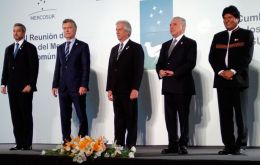
The presidents of all Mercosur member and associate countries gathered Tuesday in Montevideo for a summit to redefine the bloc's future, in light of recent statements from Brazil's future government that the region will not be among the priorities of Jair Bolsonaro when he becomes president on January 1.
-
Monday, December 17th 2018 - 21:34 UTC
Argentine cemetery benefactor visits Falklands to say “thank you” for the joint humanitarian identification program

Argentine entrepreneur Eduardo Eurnekián, who financed the Argentine cemetery in the Falkland Islands to bury with dignity those who perished in the 1982 war and also the March 26 flights for relatives to visit the graves of the newly-identified bodies, last week flew to the Islands to the place that has touched his heart since 2003 and thank everybody for the humanitarian accomplishment.
-
Monday, December 17th 2018 - 08:35 UTC
Cristina Fernandez is back on stage and preparing for her presidential bid next October
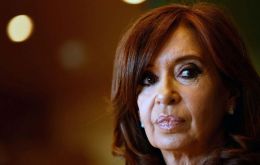
Argentine ex-president and Senator Cristina Fernandez de Kirchner is back on stage and looking to run in next October's presidential election, hopefully with a united opposition. Mandatory primaries in Argentina are only eight months away and several of her acolytes over the weekend and with her blessing announced she is prepared to run for the presidency.
-
Monday, December 17th 2018 - 08:09 UTC
Argentina creates two marine protected areas in the South Atlantic
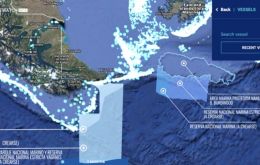
Argentina has officially created two large marine protected areas: the Yaganes Marine National Park, lying off of the country’s southern tip, and the Namuncurá-Burdwood Bank II Marine National Park in the South Atlantic. Together, the two parks cover a total area of about 98,000 square kilometres.
-
Sunday, December 16th 2018 - 23:44 UTC
Argentine city of Rosario to grant allowance to victims of gender violence

The City Hall of Rosario has passed an ordinance whereby victims of gender violence housed in one of the city shelters are to collect a monthly allowance of 2,000 pesos (52 US dollars) during six months, it was reported.
-
Saturday, December 15th 2018 - 09:27 UTC
Falklands-Buenos Aires link: Argentina awards license and route to low-cost airline

The Argentine government awarded low-cost airline Flybondi a 15-year license to exploit 284 domestic and international routes, including one that potentially can link Buenos Aires directly with the Falkland Islands.
-
Friday, December 14th 2018 - 09:29 UTC
British ambassador praises Buenos Aires urban transport on an emergency day

British ambassador in Argentina Mark Kent attended a conference and lunch in downtown Buenos Aires, and forced by rain, no embassy vehicle or taxi, simply took a local bus back to the office.
-
Friday, December 14th 2018 - 08:54 UTC
A third of the Argentine population is considered poor
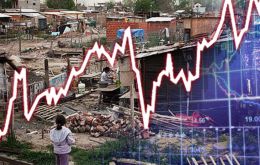
Poverty in Argentina has risen to its highest in eight years, a new report has revealed, with more than a third of the population now considered to be poor. The new survey, from the Catholic University of Argentina's Social Debt Observatory, found that 33.6% of Argentines were living below the poverty line in the third quarter of the year.
-
Thursday, December 13th 2018 - 06:22 UTC
Falklands goes ahead with negotiations and contract for second commercial flight

The Executive Council has today Wednesday authorised the Chief Executive of the Falkland Islands Government to complete the necessary negotiations with LATAM Airlines Brazil and to finalise a contract, subject to agreement with MLAs, to establish and operate a new weekly route between Sao Paulo and the Falkland Islands.
-
Wednesday, December 12th 2018 - 18:55 UTC
Environmentalists seek legal injunction to stop pollution of Lake Nahuel Huapi in Bariloche
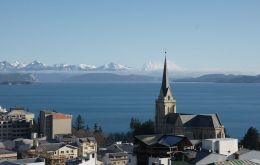
Lake Nahuel Huapi has been receiving around 75 million litres of untreated sewage for the past three days due to the maintenance and removal of materials in the Elevator Station of the Wastewater Treatment Plant in Bariloche and environmentalist organisations have already filed for an amparo remedy to stop the spill.
